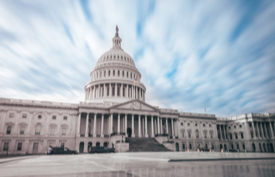Top Ten Non-Healthcare False Claims Act Recoveries of 2019

This year, federal and state governments recovered hundreds of millions of dollars thanks to whistleblowers who came forward to report fraud under the federal False Claims Act and state False Claims Acts. Whistleblowers reported a wide-range of misconduct involving government contracts, including fraud by defense contractors, airlines, and even a major research university. Defendants’ deception ran the gamut from lying about cybersecurity capabilities and pricing practices to skirting visa requirements for foreign-born employees and quality standards for items sold to our military. Below, we’ve gathered the top ten Non-Healthcare False Claims Act recoveries for 2019.
-
- Morgan Stanley — mortgage fraud. In April, Morgan Stanley was held accountable, at least in part, for its role in the 2007 financial crisis. The company agreed to pay the State of California $150 million to settle allegations that it lied about the risk of the residential mortgage-backed securities it sold to CalPERS and the California State Teachers Retirement System. The scheme caused millions in losses to the two pension funds, hurting thousands of families relying on pension payments.
- South Korea fuel bid rigging. Constantine Cannon attorneys Eric Havian, Poppy Alexander, and Hallie Noecker helped recover another $127 million from South Korean companies that conspired to rig their bids to inflate the cost of fuel supplied to U.S. military bases in South Korea. DOJ added Hyundai Oilbank Co. Ltd and S-Oil Corporation to a list of three other defendants who have agreed paid a total of $363 million in this ongoing federal investigation initiated by our whistleblower client.
- Duke University—research fraud. In March, DOJ inked a $112.5 million settlement with Duke University, which was charged with submitting falsified data to the National Institutes of Health and the Environmental Protection Agency in connection with dozens of federal grants worth hundreds of millions of dollars. The DOJ awarded the whistleblower, a Duke researcher, over $33 million for his role in wrangling the Blue Devils. The settlement puts academic institutions on notice—honesty in research isn’t just an ethical imperative, it also affects the bottom line.
- Hydro Extrusion—defense contract fraud. Hydro Extrusion, a manufacturer of parts for rockets and missiles used by NASA and the Missile Defense Agency, agreed to pay $46 million for falsifying critical tests over a 19-year period. The company’s employees allegedly altered the test results for aluminum parts used in the joints of rockets and missiles, changing failing scores to passing ones. NASA believes that Hydro’s fraud caused at least two failed rocket launches.
- Unitrans—Iran sanctions violations. Constantine Cannon attorneys represented whistleblowers in a case against Unitrans International, a defense contractor accused of illegally transporting goods through Iran under a contract to support American troops in Afghanistan. The company was also accused of lying about its violation of Iranian sanctions to obtain additional defense contracts. The government settled the case for $45 million in December.
- Hikmat—defense contract fraud. In March, the DOJ recovered $25 million from an Afghani company, Hikmat Shadman Logistics Services Company, accused of overcharging the military for services provided to troops overseas, falsifying thousands of documents and even billing for work it never performed. According to the DOJ, Hikmat also bribed U.S. service members to obtain additional defense contracts.
- American Airlines—government contract fraud. American Airlines paid more than $22 million to resolve allegations that it lied to the U.S. Postal Service about mail delivery times. Under a USPS contract, American agreed to deliver—on time—certain mail to domestic and international locations. American also agreed to pay penalties when it failed to make timely deliveries. Rather than pay penalties for its delays, the government accused American of falsifying delivery times.
- Informatica—government pricing fraud. In May, the DOJ settled allegations of overcharging against Informatica Corporation, a Silicon-Valley based company that sells tools for managing data warehouses. The company was accused of ripping off the government by lying about prices and discounts, causing the General Services Administration to pay more than it should have for Informatica’s products. The whistleblower who initiated the suit received $4.3 million of the $21.57 million settlement.
- Hillier—small business fraud. Thanks to a whistleblower, Luke Hillier, the majority owner and CEO of defense contractor ADS, Inc., agreed to pay $20 million to settle allegations that he lied about his company’s status as a small business to obtain federal set-aside contracts reserved for actual small businesses. The whistleblower received $3.6 million for helping uncover the scheme.
- IBM—government contract fraud. In June, IBM and a subsidiary agreed to pay $14.8 million for allegedly lying to the State of Maryland about its ability to deliver a functional website and IT platform for the State’s health insurance exchange. IBM allegedly submitted a misleading bid for the state contract, advertising software that didn’t perform as stated and ultimately failed when the website when live.
Read More:
- All Our Top-10 Lists
- Constantine Cannon Whistleblower Successes
- I Think I Have a Whistleblower Case
- The Constantine Cannon Whistleblower Lawyer Team
Tagged in: Bribery and Bid-Rigging, Cybersecurity and Data Breaches, Defense Contract Fraud, FCA Federal, FCA State, Financial and Investment Fraud, Government Programs Fraud, Grant and Research Fraud, Importance of Whistleblowers, Price Fixing, Pricing Fraud, Top 10, Visa Fraud, Whistleblower Case,